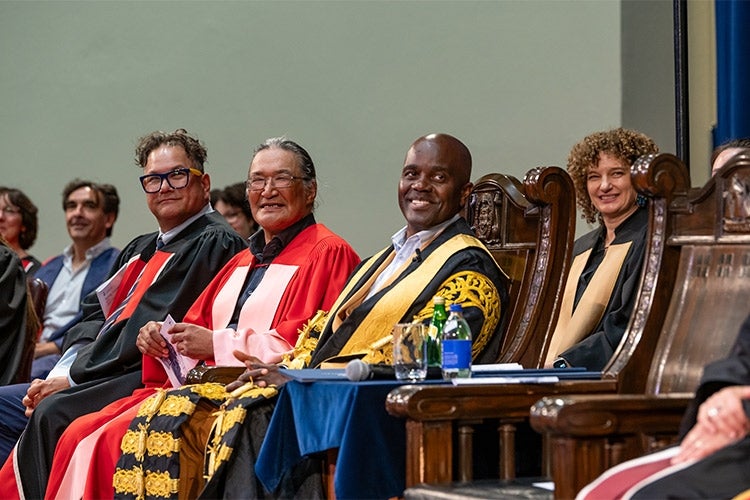Celebrated filmmaker Zacharias Kunuk receives U of T honorary degree
(photo by Lisa Sakulensky)
Published: June 19, 2025
From the High Arctic tundra to the red carpet in Cannes, filmmaker Zacharias Kunuk has redefined Indigenous storytelling in cinema and changed how the world sees Inuit life.
Today, for his acclaimed achievements in the arts and entertainment as one of Canada’s most internationally celebrated filmmakers, Kunuk will receive a Doctor of Laws, honoris causa, from the University of Toronto.
Kunuk was born in 1957 at his Inuit family’s winter camp in Kapuiviit in the Northwest Territories (now Nunavut). He recalls, as a child, hearing Inuit folktales and watching the men hitch the dogs to the sled to go hunting. “It was my job, every time they stopped for tea, to untangle the ropes,” he said in a 2002 interview with Native Networks.
When he was nine, at the direction of Canadian government officials, his parents sent him and his brother to school in Igloovik, a small town near Baffin Island, where they learned to write and speak English.
It was in Igloovik that Kunuk discovered movies. Once a week, the town hall screened old Hollywood westerns. Although few audience members spoke English, Kunuk says the stories felt familiar. “We had them in our own culture,” he told Frieze magazine in 2019.
Each movie cost a quarter, so Kunuk began carving soapstone to pay the admission. He sold his work at the screenings and developed a strong reputation for his art. He saved the money he earned and, during a 1981 trip to an Inuit art gallery in Montreal, bought a video camera, tripod, TV and a VCR.
He taught himself how to use them. “I had finished Grade 8 at school, and understood enough English to read the manual,” he told Frieze. “But I had no technical experience.”

Kunuk says his TV was one of the first in the community, but there was no Inuktitut programming – and shows about the Inuit often got things wrong. “I wanted to produce films from the Inuit point of view,” Kanuk told Frieze. So, he began working as an independent videographer in Igloolik, documenting hunting and other features of Inuit life.
Then, in 1982, he joined the recently launched Inuit Broadcasting Corporation, working his way up to senior producer and station manager. In 1988, he co-founded Igloolik Isuma Productions (isuma means “to think” in Inuktitut), where he made his first dramas and documentaries – including a film about how Inuit songs are composed.
In 1998, he began work on a mystical thriller based on an ancient Inuit folktale. The resulting film – Atanarjuat (The Fast Runner) – made history as the first feature written, produced, directed and acted by Inuit in the Inuktitut language. (Kunuk told the Globe and Mail he only expected one or two people to show up to the film’s open casting call – he got 30.)
Atanarjuat premiered at the 2001 Cannes Film Festival and became the first Canadian film to win the Caméra d’Or for best first feature. It went on to receive 19 awards worldwide, including five Genie Awards – for best feature, best director, best screenplay, best editing and best original score. Atanarjuat was also an art-house hit, grossing nearly $4 million in Canada and the United States.
Kunuk has since written, directed or produced several more films. For his 2021 film Angakusajaujuq: The Shaman’s Apprentice, Kunuk used stop-motion animation and miniature dolls to tell the story of a young woman who faces her first test as a healer. His most recent project, Wrong Husband, is a historical drama centred on two young Inuit lovers kept apart by tragic circumstances.
In 2007, he even videotaped the rescue of his 81-year-old father, Enoki Kunuk, who went missing for 27 days in the Arctic tundra.
Reflecting once on his motivation, Kunuk said he wants to preserve Indigenous culture for future audiences and show it to current ones. “A hundred years from now, when we’re long gone, people will study these films,” he told Nuvo Magazine in 2021. “We’re trying to get the history correct to show what happened to us.”
An Officer of the Order of Canada, Kanuk has received a National Arts Award, the National Aboriginal Achievement Award, and, in 2017, the Technicolor Clyde Gilmour Award from the Toronto Film Critics Association.



